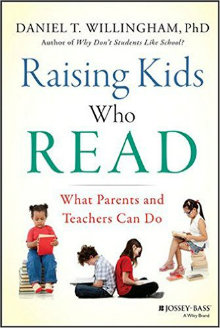Willingham: Ideas to Raise Kids Who Read
Raising Kids Who READ: What Parents and Teachers Can Do
By Daniel T. Willingham, PhD
(Wiley/Jossey-Bass, 2015 – Learn more)

As a teacher and a parent I am always reflecting on both jobs – trying to make sure both my students and my daughter are getting the best opportunities to develop literacy skills.
My daughter is just about three, and it is my hope that she will enjoy reading. I don’t believe I am being overbearing in my intentions. We set aside time for reading together, have plenty of books at home, and make frequent trips to the library, and I try to model good reading behavior.

“Raising a reader arguably begins and ends with motivation. If the child lacks decoding skills or the background knowledge to support comprehension, she’ll gain them through reading, and if she’s motivated, she’ll read.”
“I see reading motivation as fragile and as difficult to bring back once it’s gone. The proper role for a parent is enthusiastic cheerleader and good model of reading, not assigner of reading chores.”
A reader’s self-image
Willingham constantly brings us back to the concepts of motivation and the child’s self-concept as a reader. In the very early years the responsibility lies mostly with the parents, and it can seem like a very daunting task. Even for people who presumably have expertise in motivating children – teachers – it can seem overwhelming.
I am so glad I read this book when I did because it helped reassure me that I am doing some things right, and that it’s not too late to change some other behaviors. And while the challenge may be greater as kids grow up, it’s never too late to have an impact.
If your child is older, but you still feel like you want them to be “better” readers, then grab this book. It’s split into three sections by age, and the beginning chapter discusses some of the science of reading.
The science of reading
You can use the book à la carte if you’d like to target the specific age of your child/students, but I suggest reading the science of reading section first. It is not too long or too dry, and it provides the appropriate amount of background knowledge and the right context in which to acclimate yourself for the upcoming chapters.
One of the most interesting concepts the book continues to address is background knowledge. Willingham states several times that background knowledge is key to reading comprehension but frequently overlooked when teaching reading.
Reading widely
A diagram in the book shows the amount of time spent on various subjects in elementary school. Science and social studies take up very little time, yet they are the subjects that add a great deal of background knowledge that will support future reading comprehension. Willingham even suggests that elementary teachers are spending too much time on various ELA activities that may not be adding much to a student’s future comprehension.
I would definitely recommend Raising Kids Who READ to both parents and teachers. Overall I feel the book is more geared to parents. It will give them an understanding of what is happening at school and make them better able to supplement that learning at home. It is certainly true that during the early years a child’s interest in reading is the responsibility of the parents.
A resource-packed read for teachers
I would, however, also recommend that teachers read this book as a great overall explanation of the science of reading. In addition, Willingham includes great endnotes, suggestions for further reading, and a complete “works cited” section.
__________
Michael DiClemente is a sixth grade Social Studies teacher at the Andrews Middle School in Medford, Massachusetts. Michael also advises the Yearbook Club and the new Middle School Model UN Club. Check MiddleWeb for Michael’s other reviews.

































